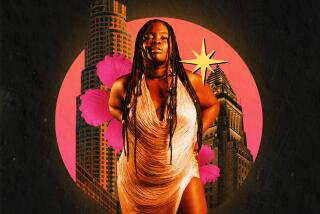Valdes’ Piano Transcends All Politics
- Share via
Sweeter than sugar, more satisfying than a cigar, pianist Jesus “Chucho” Valdes, embargo or not, might be Cuba’s most valuable export. His quartet’s appearance Monday at the Irvine Barclay Theatre showed why Valdes is one of the few truly innovative pianists on the scene.
The son of renowned mambo innovator Ramon “Bebo” Valdes, Chucho Valdes, 58, helped establish the Orquesta Cubana de Musica Moderna in his homeland in the late ‘60s while playing an important role in displacing the Cuban government’s view of American jazz as subversive.
In 1973, he joined with fellow OCMM members trumpeter Arturo Sandoval and saxophonist Paquito D’Rivera in Havana to form Irakere, the groundbreaking jazz-fusion band championed by Dizzy Gillespie. Later, when Sandoval and D’Rivera defected to the U.S., Valdes chose to stay in Cuba because, as he has told interviewers, he wanted to stay in touch with the Afro-Cuban rhythms of his birthplace.
The political consequences aside, Valdes’ choice was a wise one musically. While D’Rivera and especially Sandoval have lost their identities as they’ve slipped into a homogenized, commercially oriented style of contemporary jazz, Valdes’ music has become something larger, embracing a challenging direction that combines jazz and a variety of Afro-Cuban rhythms.
Valdes’ sound has progressed over the last few years. His first American performances after overcoming U.S. visa restrictions in 1993 displayed a dense, often harmonically crowded attack.
His approach since, as heard in Monday’s concert jointly sponsored by the Barclay and the Philharmonic Society of Orange County, has been refined. Though Valdes is still capable of tremendous density and overpowering crescendos, he’s also developed a certain economy in his play. There were times Monday when understatement became as important as a full-out assault.
Teamed with bassist Lazaro Rivero Alarcon, percussionist Adel Gonzalez Gomez and drummer Ramses Rodriguez Barlt, Valdes, an imposing presence at the keyboard at 6-foot-6 tall, seemed liberated by the rhythms of his homeland, even as he applied them to material from the American songbook.
After getting a beautiful, introspective solo piano introduction, “My Funny Valentine” turned gracefully on a light dance figure. “Embraceable You” saw a variety of salsa rhythms rise, turn and then reassert themselves. “On Green Dolphin Street” began seductively, then jumped ahead on a driving beat that Valdes pumped with dissonant, cross-handed passages reminiscent of Cecil Taylor.
But straight-ahead jazz rhythms also came to the fore with up-tempo hard-bop, marches, stride, bump-and-grind swing and Les McCann-styled funk all surfacing at different times. The occasional blues reference and frequent quotes from other songs popped up, everything from “Mona Lisa” and “Down Mexico Way” to Joe Zawinul’s “Birdland.” Throughout, the pianist kept up an entrancing narrative flow, like an esteemed lecturer who touches on a host of disciplines during his address.
Still, the central feeling was one of passion, serious and in fun, evident not only in the music’s sound but in Valdes’ visible delight in what he was playing.
That passion was shared by his bandmates, who kept the rhythmic backdrop involved and intense. Gomez’s percussion solos transcended the usual pitter-patter of conga players, at one point mimicking the phrases that Valdes’ struck from the keyboard. Bassist Alarcon supplied the perfect combination of rhythmic and harmonic support, emphasizing one solo with strongly strummed chords.
In light of the current tensions between the U.S. and Cuba, Valdes’ concert made a strong, if unspoken, statement regarding the importance of art and culture in establishing individual and national relationships. The kind of freedom Chucho Valdes brings to the piano transcends politics.
More to Read
The biggest entertainment stories
Get our big stories about Hollywood, film, television, music, arts, culture and more right in your inbox as soon as they publish.
You may occasionally receive promotional content from the Los Angeles Times.










